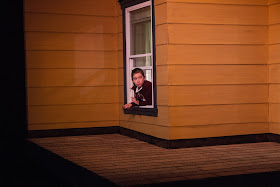“The Pellowman”

 Remember “Calvin and Hobbes,”
Bill Watterson’s great comic strip that ran in newspapers from 1985-1995? It’s
the one featuring the naughty, precocious, imaginative, yet childishly naïve, six-year-old
Calvin, and his stuffed tiger, Hobbes. The latter is the kid’s talking, worldly-wise,
best friend, even though everyone else sees him as a lifeless toy. It’s a relationship
I couldn’t get out of my mind as I watched Erin Mallon’s vaguely titled, sentimental,
two-hander, The Net Will Appear, a
slender piece at 59E59 that might better have been called Rory and Nard.
Remember “Calvin and Hobbes,”
Bill Watterson’s great comic strip that ran in newspapers from 1985-1995? It’s
the one featuring the naughty, precocious, imaginative, yet childishly naïve, six-year-old
Calvin, and his stuffed tiger, Hobbes. The latter is the kid’s talking, worldly-wise,
best friend, even though everyone else sees him as a lifeless toy. It’s a relationship
I couldn’t get out of my mind as I watched Erin Mallon’s vaguely titled, sentimental,
two-hander, The Net Will Appear, a
slender piece at 59E59 that might better have been called Rory and Nard. |
| Eve Johnson, Richard Masur. Photo: Jody Christopherson. |
Rory has moved in only recently with her mother and stepfather
(“bonus dad” is the operative phrase) and siblings. Ignored by her parents, including
her real father, she’s desperate for someone to talk to, which leads to her
striking up a friendship with the borderline curmudgeon next door. Nard, as Rory
calls him, is the kind of guy who sets mousetraps on a tree to catch the sparrows
that annoy him. Of course, his problems go deeper, what with his continuing grief
over the loss of his own child many years ago and the worsening dementia of his
beloved wife, Irma.
 |
| Eve Johnson. Photo: Jody Christopherson. |
As the months go by, the garrulous kid—a Jew who attends
Catholic parochial school—and the hesitant old duffer—whose chief occupation is
sitting in his folding chair and sipping Jim Beam—become mutually adoring pals.
Surprise!
She, casually sprinkling her lines with the kind of profanities
normally reserved for older characters, and now and then saying unintentionally
hurtful things, expostulates on various subjects with a mingling of words and intellectual
concepts beyond her years. Many of her remarks are quoted directly (albeit not
always fully understood) from her elders. Nevertheless, she’s just as likely to
stumble when the playwright strains for a laugh.
 |
| Richard Masur. Photo: Jody Christopherson. |
For instance, she announces her ambition to be a choreographer,
a dolphin trainer, and a detective, and tosses off words like anthropomorphize;
on the other hand, when she first meets Bernard she thinks his name is Great
Dane because she knew it was “the name of some awesome dog.” Clunk. Or when Bernard
says he’s Episcopalian she tells him it would be nicer for him not to call
himself an alien but an “undocumented worker.” Clunk again. Malapropisms, like
confusing “flatulence” with “turbulence” or “rumor” for “tumor” are stretches for
this apparent whiz kid. And maybe it’s best I don’t describe the bit about her “lady
goblet.” There’s so much of such inane chatter, it’s a relief the play ends
after an hour and a half.
 |
| Richard Masur. Photo: Jody Christopherson. |
At the same time, Bernard, until he gets his big emotional
scenes toward the end, serves mainly to correct, advise, admonish, and
support Rory's nonstop commentary. In other words, much as Hobbes does for Calvin,
Bernard serves as Rory’s dryly sardonic straight man, offering the grownup
perspective that Calvin so obviously lacks. Why Mallon finds it necessary to
tag him with such unnecessary tics as a habit of saying “pellow” for “pillow”
needs a greater mind than mine to decipher.
Which isn’t to deny that there are indeed some clever
moments, even if Rory’s verbal skills, interests, and general knowledge often
seem to defy belief. There was certainly considerable laughter in the house.
Rory has to be a devilishly difficult part for a child to
play and Eve Johnson acquitted herself well enough,
speaking many of her (too) rapidly delivered lines from the side of her mouth
with a kind of knowing insouciance. As might be expected from a child actor in
such a big part, though, her frequent transitions felt as though they’d been specifically
requested by director Mark Cirnigliano. Veteran Richard Masur has played
overtly gruff but actually warmhearted characters like Bernard often enough so
that he need do little more than say the words and we accept him.
 |
| Richard Masur. Photo: Jody Christopherson. |
The Net Will Appear,
whose title is intended to suggest that if you make that leap you’ll always be
saved by the net, is a minor time passer. It makes no great leaps, however. For
me, the play’s significance lies in reminding me of how much I miss “Calvin and
Hobbes.”
OTHER VIEWPOINTS:
59E59 Theaters
59 E. 59 St., NYC
Through December 30
